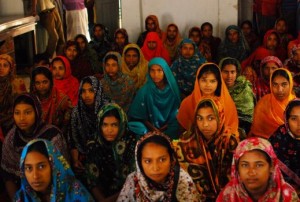 The New Republic recently published a piece by Sebastian Strangio that exposes the dark underbelly of microfinance. Strangio highlights a Bangladesh-based story about impoverished rural farmers forced to sell their organs on the black market to repay their microfinance loans. This tragedy emphasizes the growing backlash on the ground and in the academy against microfinance as a strategy for economic empowerment and international development. Strangio also provides a short history of the microfinance movement and microfinance institutions (MFIs) as well as a roll-call of the most recent—and powerful—critiques of microfinance.
The New Republic recently published a piece by Sebastian Strangio that exposes the dark underbelly of microfinance. Strangio highlights a Bangladesh-based story about impoverished rural farmers forced to sell their organs on the black market to repay their microfinance loans. This tragedy emphasizes the growing backlash on the ground and in the academy against microfinance as a strategy for economic empowerment and international development. Strangio also provides a short history of the microfinance movement and microfinance institutions (MFIs) as well as a roll-call of the most recent—and powerful—critiques of microfinance.
Strangio’s article struck us because it echoed many of the concerns we have had as a grassroots grantmaker about the efficacy and feasibility of microfinance. AJWS takes a holistic approach to microfinance by utilizing it as one strategy within our broader economic justice work. We believe that communities, through representative grassroots organizations, are best equipped to envision, articulate and implement strategies for their own development. So, we support our grassroots partners to design and carry out microfinance initiatives when it makes sense in context to do so.
The economic justice programs implemented by AJWS’s partners vary widely, but one common thread is that they pair micro-loans or micro-grants with multiple strategies: human rights education; financial and organizational capacity building; policy advocacy around struggles for natural resources including land and water; and forming co-operatives. AJWS’s partners often request support for a microfinance component because it enables them to help marginalized communities meet immediate needs while they advocate for structural changes over the long term. And, as Strangio rightly points out, though there is an overwhelming emphasis on micro-loans and access to credit, micro-savings initiatives are increasingly used at the grassroots level and offer an important alternative to deeply flawed microcredit schemes.
In disaster and post-conflict contexts, AJWS supports microfinance efforts that are community-based and community-owned, have the flexibility to address a variety of community needs and take a holistic approach to rehabilitation. After the 2004 Indian Ocean Tsunami, the Indonesian NGO Women’s Volunteer Team for Humanity (RPuK) recognized a need to target women in relief efforts and embraced community-based microfinance—specifically revolving funds—as a strategy for helping women restart their livelihoods. RPuK addresses head-on the complex social and political factors that lead women to face human rights violations on a daily basis by coupling its microfinance work with equal emphasis on human rights, conducting trainings on women’s rights, leadership and participation in democratic and decision-making processes.
AJWS believes that in order for microfinance not to be harmful, it needs to be locally owned. It is refreshing to see the principle of local ownership championed by practitioners and academics in the field of international development. We applaud Strangio for shedding light on a world of controversy that illustrates the failings of microfinance as an empowerment strategy.
AJWS’s work in countries and communities changes over time, responding to the evolving needs of partner organizations and the people they serve. To learn where AJWS is supporting activists and social justice movements today, please see Where We Work.

